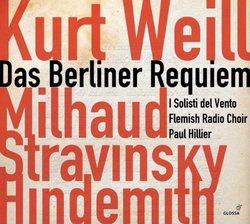Music against war, the power of simplicity and clarity
R. Hutchinson | a world ruled by fossil fuels and fossil minds | 04/25/2010
(5 out of 5 stars)
"This is a brilliant, beautiful set, featuring the powerful Brecht-Weill cantata for men's choir, "Das Berliner Requiem," written in 1928 on commission from Frankfurt Radio to commemorate the 10th anniversary of the end the Great War. Brecht did not actually write anything for this work in particular -- Weill chose preexisting Brecht poems from the "Hauspostille," images of death through the eyes of the people, and set them to music. But this disc is more than just a choral assortment with Hindemith and Milhaud, it is a coherent program of works from between the wars, reflecting the times musically, politically and socially. Some might prefer an all-choral set, but I think it was a master stroke to break up the choral pieces with Stravinsky's "Octet for Wind Instruments," it all hangs together perfectly.
The 50-page booklet provides English translations from the original German and French, and this is essential, especially for Brecht's poetry. The "Requiem," approximately 20 minutes long, begins and ends with a "Great Hymn of Thanksgiving." In Brecht's humanism there is no going to God or heaven, but equality with all life, for all living things must die. "You are not what matters, and you can die free from care," may sound cold, but it expresses an acceptance that makes perfect sense from a Buddhist perspective. The third of the six parts is the short "Epitaph," for Red Rosa, Rosa Luxembourg, the socialist and pacifist, murdered by the authorities -- "Because she told the poor the truth, the rich hounded her from life." Parts four and five are the real heart of the work, the "First and Second Reports on the Unknown Soldier under the Triumphal Arch." Brecht's biting wit tells how the Unknown Soldier was killed, obliterated and buried under tons of stone so that he "should never rise up at the day of judgement...and call us recognizable ones to justice." It concludes by wondering why those who slew him are still alive.
Weill sets these poems to stark, simple and powerful music, performed beautifully here by the Flemish Radio Choir & I Solisti del Vento instrumental ensemble, led by Paul Hillier. Ivan Goossens is featured on tenor, and and Jacob Bloch Jespersen on bass. Jespersen sings "Vom Tod im Wald" (9'09) as well, which is placed directly after the "Requiem." Weill originally included it in the "Requiem," but later changed his mind and removed it.
Paul Hindemith's short "Der Tod" (2'44 -- 1932) follows, a Holderlin setting, and its rich harmony provides both contrast and respite from the stark world of Brecht and Weill. Next comes Stravinsky's "Octet," (15'22 -- 1923)which is seen as inaugurating the Neoclassical style. The booklet essay makes an argument that Stravinsky's neoclassicism was a reaction to the perceived connection between late Romantic excess and war. Whether there is any actual connection, it is interesting that the turn to classical symmmetry as a virtue can be seen as part of the same movement that led to socialist realism and the down-to-earth music of Brecht and Weill. In any event, the piece sounds fantastic in this context. Finally we hear Darius Milhaud's "Cantate de la Guerre" (11'19 -- 1940) and "Cantate de la Paix," (8'14 -- 1937), the Cantatas of War and Peace. These lovely works for full choir are works of Jewish religious devotion, in sharp contrast to Brecht's humanism. Milhaud's texts are poems by Paul Claudel, powerful statements of a God of justice and peace.
At this point in April, this stands as one of the finest new releases of 2010. I warmly recommend it to all lovers of music, lovers of Brecht's poetry, lovers of humanity, lovers of God, lovers of peace, lovers of justice, lovers of nature, and lovers period!
(verified purchase from ArkivMusic)"


 Track Listings (13) - Disc #1
Track Listings (13) - Disc #1